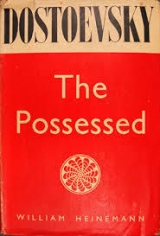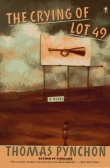
Текст книги "The Possessed"
Автор книги: Федор Достоевский
сообщить о нарушении
Текущая страница: 47 (всего у книги 49 страниц)
“Five farthings' worth, I suppose?”
“Five, yes, five, five, five, un tout petit rien,” Stepan Trofimovitch assented with a blissful smile.
Ask a peasant to do anything for you, and if he can, and will, he will serve you with care and friendliness; but ask him to fetch you vodka – and his habitual serenity and friendliness will pass at once into a sort of joyful haste and alacrity; he will be as keen in your interest as though you were one of his family. The peasant who fetches vodka – even though you are going to drink it and not he and he knows that beforehand – seems, as it were, to be enjoying part of your future gratification. Within three minutes (the tavern was only two paces away), a bottle and a large greenish wineglass were set on the table before Stepan Trofimovitch.
“Is that all for me!” He was extremely surprised. “I've always had vodka but I never knew you could get so much for five farthings.”
He filled the wineglass, got up and with a certain solemnity crossed the room to the other corner where his fellow-traveller, the black-browed peasant woman, who had shared the sack with him and bothered him with her questions, had ensconced herself. The woman was taken aback, and began to decline, but after having said all that was prescribed by politeness, she stood up and drank it decorously in three sips, as women do, and, with an expression of intense suffering on her face, gave back the wineglass and bowed to Stepan Trofimovitch. He returned the bow with dignity and returned to the table with an expression of positive pride on his countenance.
All this was done on the inspiration of the moment: a second before he had no idea that he would go and treat the peasant woman.
“I know how to get on with peasants to perfection, to perfection, and I've always told them so,” he thought complacently, pouring out the rest of the vodka; though there was less than a glass left, it warmed and revived him, and even went a little to his head.
“ Je suis malade tout a– fait, mais ce n'est pas trap mauvais d'etre malade.”
“Would you care to purchase?” a gentle feminine voice asked close by him.
He raised his eyes and to his surprise saw a lady – une dame, et die en avait Pair,somewhat over thirty, very modest in appearance, dressed not like a peasant, in a dark gown with a grey shawl on her shoulders. There was something very kindly in her face which attracted Stepan Trofimovitch immediately. She had only just come back to the cottage, where her things had been left on a bench close by the place where Stepan Trofimovitch had seated himself. Among them was a portfolio, at which he remembered he had looked with curiosity on going in, and a pack, not very large, of American leather. From this pack she took out two nicely bound books with a cross engraved on the cover, and offered them to Stepan Trofimovitch.
“ Et . . . mais je croisque c'est I'Evangile . . .with the greatest pleasure. . . . Ah, now I understand. . . . Vous etes ce qu'on appellea gospel-woman; I've read more than once. . . . Half a rouble?”
“Thirty-five kopecks,” answered the gospel-woman. “With the greatest pleasure. Je n'ai rien centre l'Evangile,and I've been wanting to re-read it for a long time. . . .”
The idea occurred to him at the moment that he had not read the gospel for thirty years at least, and at most had recalled some passages of it, seven years before, when reading Kenan's “Vie de Jesus.” As he had no small change he pulled out his four ten-rouble notes – all that he had. The woman of the house undertook to get change, and only then he noticed, looking round, that a good many people had come into the cottage, and that they had all been watching him for some time past, and seemed to be talking about him. They were talking too of the fire in the town, especially the owner of the cart who had only just returned from the town with the cow. They talked of arson, of the Shpigulin men.
“He said nothing to me about the fire when he brought me along, although he talked of everything,” struck Stepan Trofimovitch for some reason.
“Master, Stepan Trofimovitch, sir, is it you I see? Well, I never should have thought it! ... Don't you know me?” exclaimed a middle-aged man who looked like an old-fashioned house-serf, wearing no beard and dressed in an overcoat with a wide turn-down collar. Stepan Trofimovitch was alarmed at hearing his own name.
“Excuse me,” he muttered, “I don't quite remember you.”
“You don't remember me. I am Anisim, Anisim Ivanov. I used to be in the service of the late Mr. Gaganov, and many's the time I've seen you, sir, with Varvara Petrovna at the late Avdotya Sergyevna's. I used to go to you with books from her, and twice I brought you Petersburg sweets from her. . . .”
“Why, yes, I remember you, Anisim,” said Stepan Trofimovitch, smiling. “Do you live here?”
“I live near Spasov, close to the V– Monastery, in the service of Marta Sergyevna, Avdotya Sergyevna's sister. Perhaps your honour remembers her; she broke her leg falling out of her carriage on her way to a ball. Now her honour lives near the monastery, and I am in her service. And now as your honour sees, I am on my way to the town to see my kinsfolk.”
“Quite so, quite so.”
“I felt so pleased when I saw you, you used to be so kind to me,” Anisim smiled delightedly. “But where are you travelling to, sir, all by yourself as it seems. . . . You've never been a journey alone, I fancy?”
Stepan Trofimovitch looked at him in alarm.
“You are going, maybe, to our parts, to Spasov?”
“Yes, I am going to Spasov. Il me semble que tout le monde va a Spassof.”
“You don't say it's to Fyodor Matveyevitch's? They will be pleased to see you. He had such a respect for you in old days; he often speaks of you now.”
“Yes, yes, to Fyodor Matveyevitch's.”
“To be sure, to be sure. The peasants here are wondering; they make out they met you, sir, walking on the high road. They are a foolish lot.”
“I ... I ... Yes, you know, Anisim, I made a wager, you know, like an Englishman, that I would go on foot and I ...”
The perspiration came out on his forehead.
“To be sure, to be sure.” Anisim listened with merciless curiosity. But Stepan Trofimovitch could bear it no longer. He was so disconcerted that he was on the point of getting up and going out of the cottage. But the samovar was brought in, and at the same moment the gospel-woman, who had been out of the room, returned. With the air of a man clutching at a straw he turned to her and offered her tea. Anisim submitted and walked away.
The peasants certainly had begun to feel perplexed: “What sort of person is he? He was found walking on the high road, he says he is a teacher, he is dressed like a foreigner, and has no more sense than a little child; he answers queerly as though he had run away from some one, and he's got money!” An idea was beginning to gain ground that information must be given to the authorities, “especially as things weren't quite right in the town.” But Anisim set all that right in a minute. Going into the passage he explained to every one who cared to listen that Stepan Trofimovitch was not exactly a teacher but “a very learned man and busy with very learned studies, and was a landowner of the district himself, and had been living for twenty-two years with her excellency, the general's widow, the stout Madame Stavrogin, and was by way of being the most important person in her house, and was held in the greatest respect by every one in the town. He used to lose by fifties and hundreds in an evening at the club of the nobility, and in rank he was a councillor, which was equal to a lieutenant-colonel in the army, which was next door to being a colonel. As for his having money, he had so much from the stout Madame Stavrogin that there was no reckoning it”– and so on and so on.
“ Mais c'est une. dame et tres comme il faut,” thought Stepan Trofimovitch, as he recovered from Anisim's attack, gazing with agreeable curiosity at his neighbour, the gospel pedlar, who was, however, drinking the tea from a saucer and nibbling at a piece of sugar. “ Ce petit morceau de sucre, ce n'est rien. . . .There is something noble and independent about her, and at the same time – gentle. Le comme il faut tout pur,but rather in a different style.”
He soon learned from her that her name was Sofya Matveyevna Ulitin and she lived at K–, that she had a sister there, a widow; that she was a widow too, and that her husband, who was a sub-lieutenant risen from the ranks, had been killed at Sevastopol.
“But you are still so young, vous n'avez pas trente ans.”
“Thirty-four,” said Sofya Matveyevna, smiling.
“What, you understand French?”
“A little. I lived for four years after that in a gentleman's family, and there I picked it up from the children.”
She told him that being left a widow at eighteen she was for some time in Sevastopol as a nurse, and had afterwards lived in various places, and now she travelled about selling the gospel.
“ Mais, mon Dieu,wasn't it you who had a strange adventure in our town, a very strange adventure?”
She flushed; it turned out that it had been she.
“ Ces vauriens, ces malheureux,” he began in a voice quivering with indignation; miserable and hateful recollections stirred painfully in his heart. For a minute he seemed to sink into oblivion.
“Bah, but she's gone away again,” he thought, with a start, noticing that she was not by his side. “She keeps going out and is busy about something; I notice that she seems upset too. . . . Bah, je deviens egoiste!”
He raised his eyes and saw Anisim again, but this time in the most menacing surroundings. The whole cottage was full of peasants, and it was evidently Anisim who had brought them all in. Among them were the master of the house, and the peasant with the cow, two other peasants (they turned out to be cab-drivers), another little man, half drunk, dressed like a peasant but clean-shaven, who seemed like a townsman ruined by drink and talked more than any of them. And they were all discussing him, Stepan Trofimovitch. The peasant with the cow insisted on his point that to go round by the lake would be thirty-five miles out of the way, and that he certainly must go by steamer. The half-drunken man and the man of the house warmly retorted:
“Seeing that, though of course it will be nearer for his honour on the steamer over the lake; that's true enough, but maybe according to present arrangements the steamer doesn't go there, brother.”
“It does go, it does, it will go for another week,” cried Anisim, more excited than any of them.
“That's true enough, but it doesn't arrive punctually, seeing it's late in the season, and sometimes it'll stay three days together at Ustyevo.”
“It'll be there to-morrow at two o'clock punctually. You'll be at Spasov punctually by the evening,” cried Anisim, eager to do his best for Stepan Trofimovitch.
“ Mais qu'est-ce qu'il a, cet homme,” thought Stepan Trofimovitch, trembling and waiting in terror for what was in store for him.
The cab-drivers, too, came forward and began bargaining with him; they asked three roubles to Ustyevo. The others shouted that that was not too much, that that was the fare, and that they had been driving from here to Ustyevo all the summer for that fare.
“But . . . it's nice here too. . . . And I don't want . . .” Stepan Trofimovitch mumbled in protest.
“Nice it is, sir, you are right there, it's wonderfully nice at Spasov now and Fyodor Matveyevitch will be so pleased to see you.”
“ Man Dieu, mes amis,all this is such a surprise to me.”
At last Sofya Matveyevna came back. But she sat down on the bench looking dejected and mournful.
“I can't get to Spasov!” she said to the woman of the cottage.
“Why, you are bound to Spasov, too, then?” cried Stepan Trofimovitch, starting.
It appeared that a lady had the day before told her to wait at Hatovo and had promised to take her to Spasov, and now this lady had not turned up after all.
“What am I to do now?” repeated Sofya Matveyevna.
“ Mais, ma chere et nouvelle amie, Ican take you just as well as the lady to that village, whatever it is, to which I've hired horses, and to-morrow – well, to-morrow, we'll go on together to Spasov.”
“Why, are you going to Spasov too?”
“ Mais que faire, et je suis enchante!I shall take you with the greatest pleasure; you see they want to take me, I've engaged them already. Which of you did I engage?” Stepan Trofimovitch suddenly felt an intense desire to go to Spasov.
Within a quarter of an hour they were getting into a covered trap, he very lively and quite satisfied, she with her pack beside him, with a grateful smile on her face. Anisim helped them in.
“A good journey to you, sir,” said he, bustling officiously round the trap, “it has been a treat to see you.”
“Good-bye, good-bye, my friend, good-bye.”
“You'll see Fyodor Matveyevitch, sir . . .”
“Yes, my friend, yes . . . Fyodor Petrovitch . . . only good-bye.”
II
“You see, my friend . . . you'll allow me to call myself your friend, n'est-ce pas?” Stepan Trofimovitch began hurriedly as soon as the trap started. “You see I ... J'aime le peuple, c'est indispensable, mais il me semble que je ne m'avais jamais vu de pres. Stasie . . . cela va sans dire qu'elle est aussi du peuple, mais le vrai peuple,that is, the real ones, who are on the high road, it seems to me they care for nothing, but where exactly I am going . . . But let bygones be bygones. I fancy I am talking at , random, but I believe it's from being flustered.”
“You don't seem quite well.” Sofya Matveyevna watched him' keenly though respectfully.
“No, no, I must only wrap myself up, besides there's a fresh wind, very fresh in fact, but ... let us forget that. That's not what I really meant to say. Chere et incomparable amie,I feel that I am almost happy, and it's your doing. Happiness is not good for me for it makes me rush to forgive all my enemies at once. . . .”
“Why, that's a very good thing, sir.”
“Not always, chere innocente. L'Evangile . . . voyez-vous, desormais nous precherons ensembleand I will gladly sell your beautiful little books. Yes, I feel that that perhaps is an idea, quelque chose de tres nouveau dans ce genre.The peasants are religious, c'est admis,but they don't yet know the gospel. I will expound it to them. . . . By verbal explanation one might correct the mistakes in that remarkable book, which I am of course prepared to treat with the utmost respect. I will be of service even on the high road. I've always been of use, I always told themso et d, cette chere ingrate. . . .Oh, we will forgive, we will forgive, first of all we will forgive all and always. . . . We will hope that we too shall be forgiven. Yes, for all, every one of us, have wronged one another, all are guilty!”
“That's a very good saying, I think, sir.”
“Yes, yes. ... I feel that I am speaking well. I shall speak to them very well, but what was the chief thing I meant to say? I keep losing the thread and forgetting. . . . Will you allow me to remain with you? I feel that the look in your eyes and . . . I am surprised in fact at your manners. You are simple-hearted, you call me 'sir,' and turn your cup upside down on your saucer . . . and that horrid lump of sugar; but there's something charming about you, and I see from your features.. . . Oh, don't blush and don't be afraid of me as a man. Chere et incomparable, pour moi une femme c'est tout.I can't live without a woman, but only at her side, only at her side; ... I am awfully muddled, awfully. I can't remember what I meant to say. Oh, blessed is he to whom God always sends a woman and . . . and I fancy, indeed, that I am in a sort of ecstasy. There's a lofty idea in the open road too! That's what I meant to say, that's it – about the idea. Now I've remembered it, but I kept losing it before. And why have they taken us farther. It was nice there too, but here – cela dement trop froid. A propos, j'ai en tout quarante roubles et voila cet argent,take it, take it, I can't take care of it, I shall lose it or it will be taken away from me. ... I seem to be sleepy, I've a giddiness in my head. Yes, I am giddy, I am giddy, I am giddy. Oh, how kind you are, what's that you are wrapping me up in?”
“You are certainly in a regular fever and I've covered you with my rug; only about the money, I'd rather.”
“Oh, for God's sake, n'en parlous plus parce que cela me fait mal.Oh, how kind you are!”
He ceased speaking, and with strange suddenness dropped into a feverish shivery sleep. The road by which they drove the twelve miles was not a smooth one, and their carriage jolted cruelly. Stepan Trofimovitch woke up frequently, quickly raised his head from the little pillow which Sofya Matveyevna had slipped under it, clutched her by the hand and asked “Are you here?” as though he were afraid she had left him. He told her, too, that he had dreamed of gaping jaws full of teeth, and that he had very much disliked it. Sofya Matveyevna was in great anxiety about him.
They were driven straight up to a large cottage with a frontage of four windows and other rooms in the yard. Stepan Trofimovitch waked up, hurriedly went in and walked straight into the second room, which was the largest and best in the house. An expression of fussiness came into his sleepy face. He spoke at once to the landlady, a tall, thick-set woman of forty with very dark hair and a slight moustache, and explained that he required the whole room for himself, and that the door was to be shut and no one else was to be admitted, “ parce que nous avons a parler. Oui, fai beaucoup a vous dire, chere amie.I'll pay you, I'll pay you,” he said with a wave of dismissal to the landlady.
Though he was in a hurry, he seemed to articulate with difficulty. The landlady listened grimly, and was silent in token of consent, but there was a feeling of something menacing about her silence. He did not notice this, and hurriedly (he was in a terrible hurry) insisted on her going away and bringing them their dinner as quickly as possible, without a moment's delay.
At that point the moustached woman could contain herself no longer.
“This is not an inn, sir; we don't provide dinners for travellers. We can boil you some crayfish or set the samovar, but we've nothing more. There won't be fresh fish till to-morrow.”
But Stepan Trofimovitch waved his hands, repeating with wrathful impatience: “I'll pay, only make haste, make haste.”
They settled on fish, soup, and roast fowl; the landlady declared that fowl was not to be procured in the whole village; she agreed, however, to go in search of one, but with the air of doing him an immense favour.
As soon as she had gone Stepan Trofimovitch instantly sat down on the sofa and made Sofya Matveyevna sit down beside him. There were several arm-chairs as well as a sofa in the room, but they were of a most uninviting appearance. The room was rather a large one, with a corner, in which there was a bed, partitioned off. It was covered with old and tattered yellow paper, and had horrible lithographs of mythological subjects on the walls; in the corner facing the door there was a long row of painted ikons and several sets of brass ones. The whole room with its strangely ill-assorted furniture was an unattractive mixture of the town element and of peasant traditions. But he did not even glance at it all, nor look out of the window at the vast lake, the edge of which was only seventy feet from the cottage.
“At last we are by ourselves and we will admit no one! I want to tell you everything, everything from the very beginning.”
Sofya Matveyevna checked him with great uneasiness.
“Are you aware, Stepan Trofimovitch? . . .”
“ Comment, vous saves deja mon nom?” He smiled with delight.
“I heard it this morning from Anisim Ivanovitch when you were talking to him. But I venture to tell you for my part . . .”
And she whispered hurriedly to him, looking nervously at the closed door for fear anyone should overhear – that here in this village, it was dreadful. That though all the peasants were fishermen, they made their living chiefly by charging. travellers every summer whatever they thought fit. The village was not on the high road but an out-of-the-way one, and people only called there because the steamers stopped there, and that when the steamer did not call – and if the weather was in the least unfavourable, it would not – then numbers of travellers would be waiting there for several days, and all the cottages in the village would be occupied, and that was just the villagers' opportunity, for they charged three times its value for everything – and their landlord here was proud and stuck up because he was, for these parts, very rich; he had a net which had cost a thousand roubles.
Stepan Trofimovitch looked almost reproachfully at Sofya Matveyevna's extremely excited face, and several times he made a motion to stop her. But she persisted and said all she had to say: she said she had been there before already in the summer “with a very genteel lady from the town,” and stayed there too for two whole days till the steamer came, and what they had to put up with did not bear thinking of. “Here, Stepan Trofimovitch, you've been pleased to ask for this room for yourself alone. ... I only speak to warn you. ... In the other room there are travellers already. An elderly man and a young man and a lady with children, and by to-morrow before two o'clock the whole house will be filled up, for since the steamer hasn't been here for two days it will be sure to come to-morrow. So for a room apart and for ordering dinner, and for putting out the other travellers, they'll charge you a price unheard of even in the capital. . . .”
But he was in distress, in real distress. “ Assez, mon enfant,I beseech you, nous avons notre argent– et apres, le bon Dieu.And I am surprised that, with the loftiness of your ideas, you . . . Assez, assez, vous me tourmentez,” he articulated hysterically, “we have all our future before us, and you . . . you fill me with alarm for the future.”
He proceeded at once to unfold his whole story with such haste that at first it was difficult to understand him. It went on for a long time. The soup was served, the fowl was brought in, followed at last by the samovar, and still he talked on. He told it somewhat strangely and hysterically, and indeed he was ill. It was a sudden, extreme effort of his intellectual faculties, which was bound in his overstrained condition, of course – Sofya Matveyevna foresaw it with distress all the time he was talking – to result immediately afterwards in extreme exhaustion. He began his story almost with his childhood, when, “with fresh heart, he ran about the meadows; it was an hour before he reached his two marriages and his life in Berlin. I dare not laugh, however. It really was for him a matter of the utmost importance, and to adopt the modern jargon, almost a question of struggling for existence.” He saw before him the woman whom he had already elected to share his new life, and was in haste to consecrate her, so to speak. His genius must not be hidden from her. . . . Perhaps he had formed a very exaggerated estimate of Sofya Matveyevna, but he had already chosen her. He could not exist without a woman. He saw clearly from her face that she hardly understood him, and could not grasp even the most essential part. “ Ce n'est rien, nous attendrons,and meanwhile she can feel it intuitively. . . . My friend, I need nothing but your heart!” he exclaimed, interrupting his narrative, “and that sweet enchanting look with which you are gazing at me now. Oh, don't blush! I've told you already . . .” The poor woman who had fallen into his hands found much that was obscure, especially when his autobiography almost passed into a complete dissertation on the fact that no one had been ever able to understand Stepan Trofimovitch, and that “men of genius are wasted in Russia.” It was all “so very intellectual,” she reported afterwards dejectedly. She listened in evident misery, rather round-eyed. When Stepan Trofimovitch fell into a humorous vein and threw off witty sarcasms at the expense of our advanced and governing classes, she twice made grievous efforts to laugh in response to his laughter, but the result was worse than tears, so that Stepan Trofimovitch was at last embarrassed by it himself and attacked “the nihilists and modern people” with all the greater wrath and zest. At this point he simply alarmed her, and it was not until he began upon the romance of his life that she felt some slight relief, though that too was deceptive. A woman is always a woman even if she is a nun. She smiled, shook her head and then blushed crimson and dropped her eyes, which roused Stepan Trofimovitch to absolute ecstasy and inspiration so much that he began fibbing freely. Varvara Petrovna appeared in his story as an enchanting brunette (who had been the rage of Petersburg and many European capitals) and her husband “had been struck down on the field of Sevastopol” simply because he had felt unworthy of her love, and had yielded her to his rival, that is, Stepan Trofimovitch. ...” Don't be shocked, my gentle one, my Christian,” he exclaimed to Sofya Matveyevna, almost believing himself in all that he was telling, “it was something so lofty, so subtle, that we never spoke of it to one another all our lives.” As the story went on, the cause of this position of affairs appeared to be a blonde lady (if not Darya Pavlovna I don't know of whom Stepan Trofimovitch could have been thinking), this blonde owed everything to the brunette, and had grown up in her house, being a distant relation. The brunette observing at last the love of the blonde girl to Stepan Trofimovitch, kept her feelings locked up in her heart. The blonde girl, noticing on her part the love of the brunette to Stepan Trofimovitch, also locked her feelings in her own heart. And all three, pining with mutual magnanimity, kept silent in this way for twenty years, locking their feelings in their hearts. “Oh, what a passion that was, what a passion that was!” he exclaimed with a stifled sob of genuine ecstasy. “I saw the full blooming of her beauty” (of the brunette's, that is), “I saw daily with an ache in my heart how she passed by me as though ashamed she was so fair” (once he said “ashamed she was so fat”). At last he had run away, casting off all this feverish dream of twenty years – vingt ans —and now here he was on the high road. . . .
Then in a sort of delirium be began explaining to Sofya Matveyevna the significance of their meeting that day, “so chance an encounter and so fateful for all eternity.” Sofya Matveyevna got up from the sofa in terrible confusion at last. He had positively made an attempt to drop on his knees before her, which made her cry. It was beginning to get dark. They had been for some hours shut up in the room. . . .
“No, you'd better let me go into the other room,” she faltered, “or else there's no knowing what people may think. . . .”
She tore herself away at last; he let her go, promising her to go to bed at once. As they parted he complained that he had a bad headache. Sofya Matveyevna had on entering the cottage left her bag and things in the first room, meaning to spend the night with the people of the house; but she got no rest.
In the night Stepan Trofimovitch was attacked by the malady with which I and all his friends were so familiar – the summer cholera, which was always the outcome of any nervous strain or moral shock with him. Poor Sofya Matveyevna did not sleep all night. As in waiting on the invalid she was obliged pretty often to go in and out of the cottage through the landlady's room, the latter, as well as the travellers who were sleeping there, grumbled and even began swearing when towards morning she set about preparing the samovar. Stepan Trofimovitch was half unconscious all through the attack; at times he had a vision of the samovar being set, of some one giving him something to drink (raspberry tea), and putting something warm to his stomach and his chest. But he felt almost every instant that shewas here, beside him; that it was she going out and coming in, lifting him off the bed and settling him in it again. Towards three o'clock in the morning he began to be easier; he sat up, put his legs out of bed and thinking of nothing he fell on the floor at her feet. This was a very different matter from the kneeling of the evening; he simply bowed down at her feet and kissed the hem of her dress.
“Don't, sir, I am not worth it,” she faltered, trying to get him back on to the bed.
“My saviour,” he cried, clasping his hands reverently before her. “ Vous etes noble comme une marquise!I– I am a wretch. Oh, I've been dishonest all my life. . . .”
“Calm yourself!” Sofya Matveyevna implored him.
“It was all lies that I told you this evening – to glorify myself, to make it splendid, from pure wantonness – all, all, every word, oh, I am a wretch, I am a wretch!”
The first attack was succeeded in this way by a second – an attack of hysterical remorse. I have mentioned these attacks already when I described his letters to Varvara Petrovna. He suddenly recalled Lise and their meeting the previous morning. “It was so awful, and there must have been some disaster and I didn't ask, didn't find out! I thought only of myself. Oh, what's the matter with her? Do you know what's the matter with her?” he besought Sofya Matveyevna.
Then he swore that “he would never change,” that he would go back to her (that is, Varvara Petrovna). “We” (that is, he and Sofya Matveyevna) “will go to her steps every day when she is getting into her carriage for her morning drive, and we will watch her in secret. . . . Oh, I wish her to smite me on the other cheek; it's a joy to wish it! I shall turn her my other cheek comme dans votre livre!Only now for the first time I understand what is meant by ... turning the other cheek. I never understood before!”
The two days that followed were among the most terrible in Sofya Matveyevna's life; she remembers them with a shudder to this day. Stepan Trofimovitch became so seriously ill that he could not go on board the steamer, which on this occasion arrived punctually at two o'clock in the afternoon. She could not bring herself to leave him alone, so she did not leave for Spasov either. From her account he was positively delighted at the steamer's going without him.








